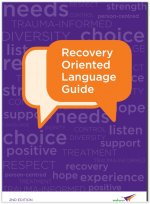
Recovery Oriented Language Guide
Omschrijving
Words are important. The language we use and the stories we tell have great significance to all involved. They carry a sense of hope and possibility or can be associated with a sense of pessimism and low expectations, both of which can influence personal outcomes.
The Mental Health Coordinating Council (MHCC) developed the Recovery Oriented Language Guide in 2013 because language matters in all aspects of life. It continues to be particularly important in the context of mental health and recovery. It is vital that words are used that convey hope and optimism, and support and promote a culture that fosters recovery.
People living with mental health conditions are amongst some of the most disadvantaged people in the Australian community, and many live with psychosocial difficulties exacerbated by historical and current trauma, poverty, poor physical health and stigma and discrimination which often feature as part of everyday experiences.3 The words that we use may effect a person’s sense of self and lead to more disadvantage and social exclusion.
General Principles
The language we use:
Represents the meanings we have constructed from experience
Prompts attitudes, expectations and actions
Should always reflect ‘unconditional positive regard’ 7 for people.
We may be unaware of how the words we use reflect our attitudes and the impact they have upon those around us.
The words we choose reflect our attitudes - that we do (or do not) truly value people, believe in and genuinely respect them.
None of us should be defined by the mental health conditions or psychosocial difficulties that we experience, or by any single aspect of who we are; we should be respected as individuals first and foremost.
